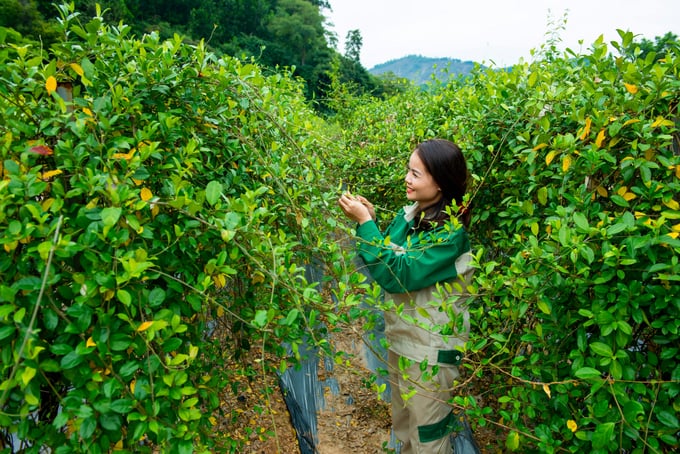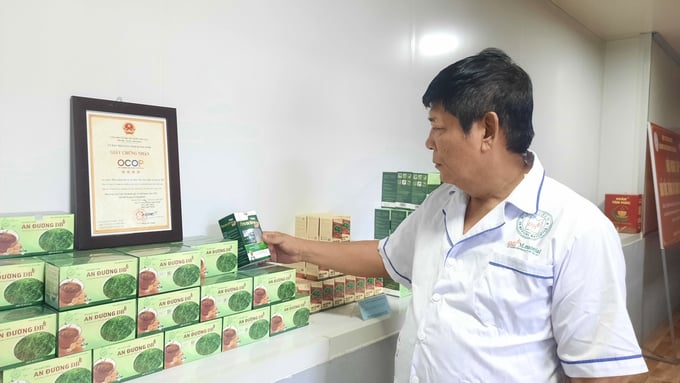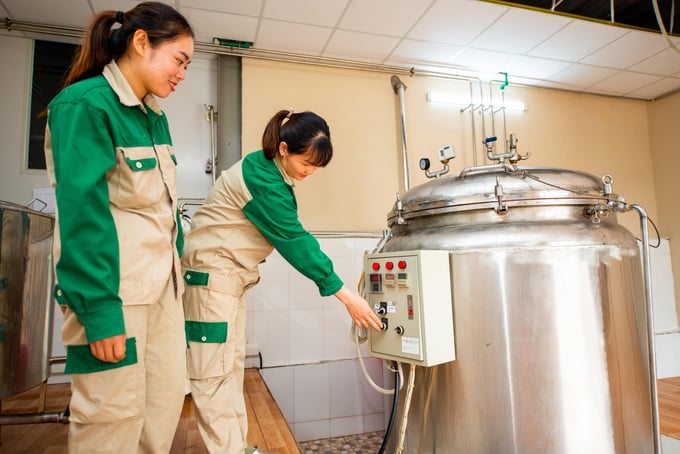June 19, 2025 | 04:37 GMT +7
June 19, 2025 | 04:37 GMT +7
Hotline: 0913.378.918
June 19, 2025 | 04:37 GMT +7
Hotline: 0913.378.918

Quang Ninh aims to become a medicinal center of the Northeast region. Photo: Nguyen Thanh.
Quang Ninh is considered as a province with great potential for medicinal plants, with particularly favorable natural conditions for the cultivation and development of these plants. The province currently has over 900 species of medicinal plants belonging to 182 families and 561 different genera, many of which are precious medicinal herbs with high economic value.
In addition to favorable climate and suitable soil conditions for medicinal plants to grow, Quang Ninh is implementing solutions to become a medicinal center of the Northeast provinces as well as the country in general.
Quang Ninh province has implemented the "One commune, one product" or OCOP program since 2013; the development of medicinal plants is carried out in conjunction with this program.
To achieve the aforementioned goals, Quang Ninh province has accelerated the planning for the development of medicinal plants in the area towards 2020 with a vision to 2030.
To gradually expand the area of medicinal plants in the province, Quang Ninh has applied policies with great incentives in terms of capital, varieties, science and technology application, among many others to encourage units and businesses to invest in large-scale models of growing and processing medicinal plants.
Namely, the model of planting and developing medicinal plants by Secoin Quang Ninh Joint Stock Company in Dong Trieu Town which specializes in producing turmeric, cloves, honeysuckle, Hoai Son, Diep Ha Chau, Crinum latifolium; the model of growing medicinal plants by Dong Son Green Technology Joint Stock Company in Ha Long City; the model by the Dong Bac Medicinal Plant Cultivation, Production and Processing Co., Ltd in Cam Pha City.
In the process of developing production of medicinal plants, several association models of production, consumption and processing of medicinal herbs have been formed between production households, cooperatives and businesses on an area of approximately 568 hectares, the main crops are Radix Morindae officinalis, yellow flower tea.
Mr. Pham Viet Trung, Director of Dong Bac Medicinal Plant Cultivation, Production and Processing Co., Ltd assessed that the association, production, consumption and processing of medicinal herbs not only help farmers maintain a stable income, maintain stable production, expansion of development scale, but also supply production facilities with quality raw materials to meet increasing production requirements. This is considered a premise for the replication of medicinal plants throughout the province in the following years.

Mr. Pham Viet Trung introducing 4 - 5 star herbal OCOP products. Photo: Nguyen Thanh.
Quang Ninh province has also implemented activities to protect, conserve and evaluate the value of genetic resources for medicinal plants, with special focus on endemic, valuable and endangered genetic resources. Moreover, the province aims to build production facilities for high-quality medicinal plant varieties; medicinal plant conservation gardens, in order to preserve the genetic resources of rare and precious medicinal plants.
Quang Ninh strives to become one of the major medicinal herbs supplying centers for domestic and foreign needs.
Quang Ninh is continuing to expand the cultivation area and expand the dominant medicinal plants in the area based on the province's available strengths. It is expected that from 2021 to 2025, the total area of medicinal plants will reach over 16,500 ha; in which, over 7,000 ha of star anise, 2,170 ha of three halves, 1,500 ha of yellow tea and more than 2,100 ha of other medicinal plants.
The development of OCOP products from medicinal herbs is a new direction, bringing economic efficiency to businesses and farmers in Quang Ninh.
According to reports by the New Rural Coordination Office in Quang Ninh province, there are 43 OCOP products manufactured and processed from medicinal herbs in the province; 23 of which have been certified for stars.
These products are becoming more popular because of their closeness to nature, low toxicity, and high therapeutic effects. Many localities currently develop OCOP products that are refined from medicinal herbs such as Ba Che, Binh Lieu, Tien Yen, Uong Bi, Hoanh Bo, Dong Trieu, Cam Pha.
At the first stage of the OCOP program in Quang Ninh, there were a considerable amount of preliminarily processed medicinal products on display. The act of preliminary processing and then selling or selling raw materials to partners is common when the province is still in the process of developing raw material areas or because the production and processing capacity is not sufficient.
Products belonging to this group are mainly folk medicines, packaged medicinal herbs, medicinal alcohols, medicinal powders, lotions, etc. However, products that are preliminarily processed or sold as raw materials are not the priority of the businesses because these products have low economic efficiency and low competitiveness. According to calculations, the economic value of raw products is only 15 to 20% of that of refined ones.

The application of science and technology has raised the quality of OCOP medicinal products. Photo: Nguyen Thanh.
Businesses have had a marked transformation, investing methodically in technology, production lines and commercial capacity after stabilizing the raw material area. Therefore, preliminarily processed products have been gradually replaced by refined products with high technology content, convenience and quality.
More businesses have made great investments, methodical steps in cooperation to improve product quality, change production specifications, packaging labels as well as the entire market. According to a survey, the production of OCOP medicinal plant products in Quang Ninh province has mainly followed an enclosed process. Businesses has been proactive about the material area and established strategies to develop the material area and ensure supply for production.
For example, Dong Bac Medicinal Plant Cultivation, Production and Processing Co., Ltd cooperated with the Institute of Medicinal Materials under Ministry of Health, Pharmaceutical Science Joint Stock Company and leading experts at the University of Pharmacy, Academy of Ethnic Medicine. The company also cooperates with households in Cam Pha city and neighboring districts in planting material areas.
So far, Dong Bac company is producing 40 products, including 8 OCOP 4 stars products, 2 OCOP 5 stars products. Notably, Dong Bac Jiao Co Lam tea is one of Quang Ninh province's 27 key agricultural products of 2021. The products are popular and widely sold to domestic and foreign markets through various channels such as online sales, shops and supermarkets across the country.
In addition to the domestic market, accessing and expanding the market and bringing OCOP products, including medicinal products to international markets is an open and promising direction. The recent trade promotion activities to Laos market at the end of August 2022 performed by the Quang Ninh delegation have resulted in many positive signals.
Afterwards, popular products such as Northeast Medicinal Tea, Bavabi, apricots, Radix Morindae officinalis, etc., will have the opportunity to restart after a long hiatus due to the Covid-19 pandemic.
In addition to Laos and Cambodia, trade promotion, access and market expansion activities for OCOP products have also been carried out in the Chinese market since 2019. These are OCOP promotion programs at ASEAN - China Trade Fairs, Vietnam - China International Tourism Trade Fair among many others.
According to recent statistics, out of nearly 200 businesses, cooperatives and establishments engaged in the production of OCOP products, there are at least 10 units producing OCOP products from medicinal plants. These units produce nearly 30 medicinal OCOP products. Many of the refined products are highly rated, with ratings ranging from 3 to 4 stars.
Translated by Nguyen Hai Long
![Turning wind and rain into action: [9] Digitizing hydrometeorological data in response to climate change](https://t.ex-cdn.com/nongnghiepmoitruong.vn/608w/files/news/2025/06/17/z6704423696987_15fd32ffc26d590d204d520c9dac6786-nongnghiep-165943.jpg)
(VAN) Farmers have begun accessing hydrometeorological applications to adjust their cropping schedules, aiming to ensure productivity and adapt to climate change.
![Turning wind and rain into action: [8] Real-time salinity detection and early warning technology](https://t.ex-cdn.com/nongnghiepmoitruong.vn/608w/files/news/2025/06/17/z6704423696987_15fd32ffc26d590d204d520c9dac6786-nongnghiep-151127.jpg)
(VAN) Thanks to the integration of modern hydrological-hydraulic models, remote sensing technologies, and artificial intelligence, the accuracy of hydrological forecasting has significantly improved.
![Turning wind and rain into action: [7] Early disaster warnings help marine farmers minimize losses](https://t.ex-cdn.com/nongnghiepmoitruong.vn/608w/files/news/2025/06/17/z6704423696987_15fd32ffc26d590d204d520c9dac6786-nongnghiep-142942.jpg)
(VAN) In recent years, thanks to early disaster warnings and forecasting, marine farmers in Khanh Hoa province have been able to reduce risks and losses, thereby improving production efficiency.
![Turning wind and rain into action: [6] ‘Four on-the-spot’ disaster management software](https://t.ex-cdn.com/nongnghiepmoitruong.vn/608w/files/news/2025/06/17/e5a48259d6a262fc3bb3-nongnghiep-183800.jpg)
(VAN) By simply activating the scenario on the disaster management software, the relevant authorities immediately know how many households need to be evacuated, where to evacuate them to, and by what means of transportation…
![Turning wind and rain into action: [5] Hue applies modern technology in disaster forecasting](https://t.ex-cdn.com/nongnghiepmoitruong.vn/608w/files/news/2025/06/17/z6704423696987_15fd32ffc26d590d204d520c9dac6786-nongnghiep-093938.jpg)
(VAN) In Hue city, modern technology has recently been applied in meteorological and hydrological forecasting and warning, helping to reduce the damage caused by natural disasters.

(VAN) A cutting-edge farming technique being implemented on an experimental ranch in Arizona's Sonoran Desert has already saved a billion gallons of water over five years, according to Civil Eats.

(VAN) Poultry and pig production and the environment can be boosted through enhanced water technology, according to new research.